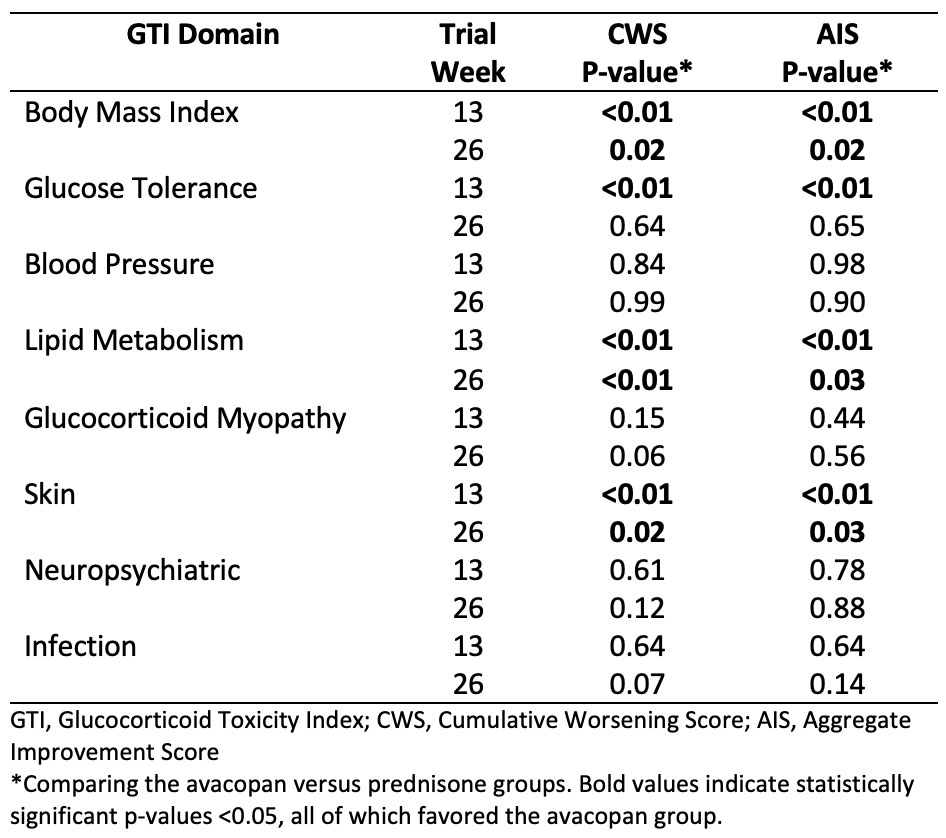Session Information
Date: Sunday, November 13, 2022
Title: Vasculitis – ANCA-Associated Poster II: Treatment Efficacy, Clinical Outcomes, Biomarkers
Session Type: Poster Session B
Session Time: 9:00AM-10:30AM
Background/Purpose: The ADVOCATE trial (Jayne DRW et al, N Engl J Med, 2021) was a randomized, double-blind, controlled trial of avacopan vs prednisone in addition to standard care in ANCA-associated vasculitis (AAV). The Glucocorticoid Toxicity Index (GTI), a composite score, measures change in GC toxicity. Data from the GTI domains provide a Cumulative Worsening Score (CWS) and an Aggregate Improvement Score (AIS), allowing investigators to track not only worsening in GC toxicity but also improvement (or aggregate change) across the full GTI and within individual domains.
In ADVOCATE, the avacopan group achieved lower overall CWS & AIS values than the prednisone group, representing less GC toxicity. At week 26, the mean CWS and AIS scores were significantly lower in the avacopan than prednisone groups, and the differences exceeded the minimum clinically important difference of the GTI. Individual GTI domain scores, however, have not been analyzed. This analysis evaluates scores from the 8 GTI domains in ADVOCATE: Body Mass Index, Glucose Tolerance, Lipid Metabolism, Blood Pressure, GC Myopathy, Skin, Neuropsychiatric, and Infection.
Methods: The CWS tabulates the cumulative total of GC-related toxicities occurring between two time points. The AIS measures aggregate change – worsening as well as improvement – adding toxicities that occur/worsen but reducing or removing those that improve/resolve. We used Mantel-Haenszel Chi-Square tests to evaluate differences between the avacopan and prednisone groups’ GTI domain sub-scores at weeks 13 and 26. Week 26 scores were the sum of scores from baseline to week 13 and from week 13 to week 26.
Results: All patients in ADVOCATE were included in the analysis. Of the 330 patients, 321 had complete data at week 13; 307 had complete data at week 26. The total mean (median) GC use during the first 26 weeks was 1,073 mg (400 mg) in the avacopan group, and 3,193 mg (2,847 mg) in the prednisone group. Multiple domains favored the avacopan group in GC toxicity reduction (Table 1). For the CWS at week 26, the distribution of scores in the Body Mass Index (P=0.02), Lipid Metabolism (P< 0.01), and Skin (P=0.02) domains all significantly favored the avacopan group. These domains also differentiated the two groups at 13 weeks. GC Myopathy and Infection showed favorable trends at 26 weeks (P=0.06 and P=0.07, respectively). Glucose Tolerance domain CWS values, were lower in the avacopan group at both 13 and 26 weeks and were statistically significant at 13 weeks (P< 0.01). For the AIS domains, Body Mass Index, Lipid Metabolism, and Skin were all lower in the avacopan group at both 13 and 26 weeks. Statistical comparisons for all domains are shown in Table 1.
Conclusion: This study confirms the substantial reduction in GC toxicity associated with replacing a standard prednisone tapering schedule with avacopan in the treatment of AAV. Moreover, these data demonstrate that the benefits were experienced across multiple domains of toxicity, emphasizing the value of a composite measure that quantifies GC toxicity directly, assessing both cumulative toxicity and aggregate change.
To cite this abstract in AMA style:
Patel N, Jayne D, Merkel P, Bekker P, zhang y, Yue H, Stone J. ANCA-Associated Vasculitis Treated with Avacopan versus a Standard Prednisone Taper: Glucocorticoid Toxicity Index Scores by Domain [abstract]. Arthritis Rheumatol. 2022; 74 (suppl 9). https://acrabstracts.org/abstract/anca-associated-vasculitis-treated-with-avacopan-versus-a-standard-prednisone-taper-glucocorticoid-toxicity-index-scores-by-domain/. Accessed .« Back to ACR Convergence 2022
ACR Meeting Abstracts - https://acrabstracts.org/abstract/anca-associated-vasculitis-treated-with-avacopan-versus-a-standard-prednisone-taper-glucocorticoid-toxicity-index-scores-by-domain/

